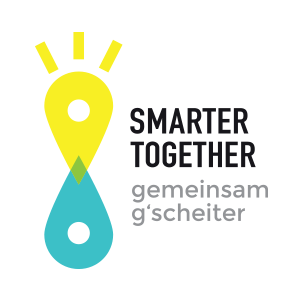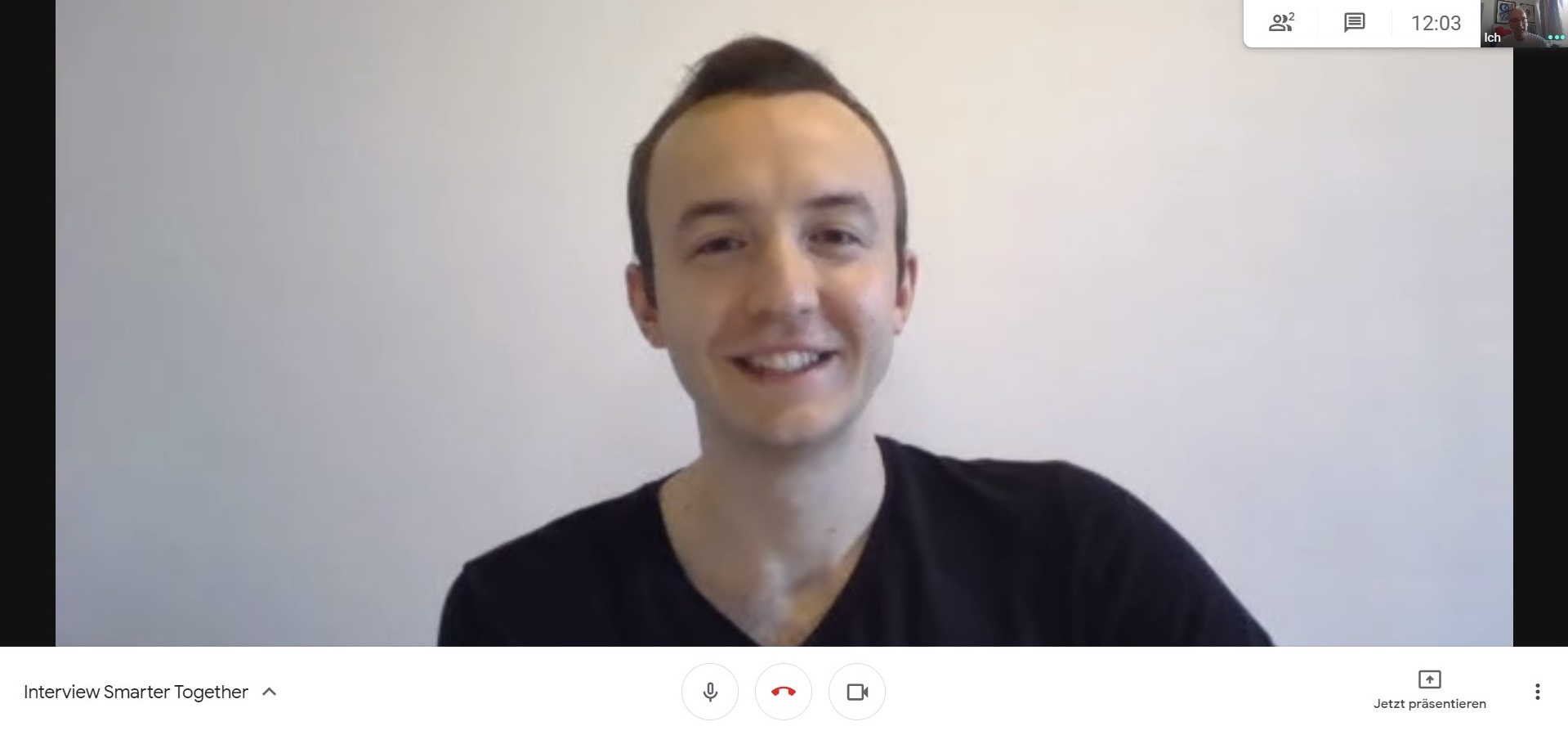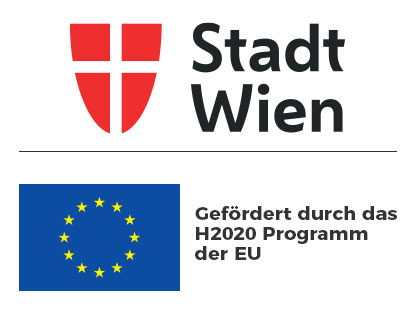Smarter Together als Forschungsobjekt
Urban Living Labs im Fokus
Interdisziplinäre europäische Studien
Am 20. September 2020 besuchte Christian Allmer in einem virtuellen Meeting Smarter Together, um zu sog. „Urban Living Labs (ULL)“ zu forschen. Christian Allmer ist Studierender des interdisziplinären Masterprogramms „4Cities„, das sechs europäische Universitäten in vier Ländern vereint.
Das Masterprogramm „4Cities“ in Urban Studies, vereint Elemente von Geografie, Soziologie, Geschichte, Kultur- und Politikwissenschaften mit dem Fokus auf Städte. Im zweijährigen Programm werden die Studierenden (aktuell 40 Personen aus 23 Ländern) in jedem Semester in einer anderen Stadt unterrichtet: Gestartet wird in Brüssel (VUB Vrije Universiteit Brussel, ULB Université libre de Bruxelles), danach geht es nach Wien (Universität Wien), Kopenhagen (KU University of Copenhagen) und Madrid (UMC Universidad Compultense de Madrid; UAM Universidad Autónoma de Madrid). 4Cities ist ein Erasmus Mundus Programm und wird von der EU unterstützt.
Forschungsthema der Masterarbeit ist die Wechselwirkung zwischen Urban Living Labs und der Stadtverwaltung. Die konkrete Forschungsfrage: In welchem Ausmaß beeinflusst die Arbeit von Urban Living Labs die Praktiken von gewöhnlichen Institutionen der Stadtplanung?
Screenshot von Christian Allmer
Was sind Urban Living Labs?
Eine kurze Internetrecherche führt zu einer prägnanten Begriffsbestimmung in einem Beitrag von Urban Labs als neue Impulsgeber einer integrativen Stadtentwicklung“ 7.8.2017), der feststellt, dass „Urban Labs“ als neue Form der städtischen Verwaltung und BürgerInnenbeteiligung einen Aufschwung in Europa [erleben]“. Konkret weiter:
„‘Living Labs‘ werden im Allgemeinen als partizipative Plattformen für offene Innovationsprozesse beschrieben, welche die NutzerInnen von Produkten oder Dienstleistungen in deren Entwicklungsprozesse miteinbeziehen. […]
Europas Städte stehen vor umfassenden sozialen, ökologischen und wirtschaftlichen Herausforderungen. Der Umgang mit diesen komplexen Veränderungsprozessen erfordert neue Herangehensweisen der städtischen Entwicklung und Verwaltung, welche die Erfahrungen, Bedürfnisse, Ideen und Sichtweisen der lokalen Bevölkerung miteinbeziehen. In den letzten Jahren etablierten sich „Urban Labs“ (Living Labs und Stadtlabore) als erfolgsversprechende Methode der integrativen Stadtentwicklung. Dabei kooperieren Kommunalverwaltungen mit anderen städtischen AkteurInnen, um das intellektuelle, kreative und soziale Potential der Menschen einer Stadt in gemeinsamen Lernprozessen zur Ko-Kreation und Erprobung innovativer Lösungsansätze auszuschöpfen.“
Smarter Together im Trend der Zeit
Auf Smarter Together lassen sich viele der angeführten Aspekte umsetzen: Mit dem SIMmobil wurden die weitere Bevölkerung von Simmering in die Smart City Prozesse einbezogen, informiert, befragt und konkret beteiligt. So konnten sich im Rahmen des SIMmobil die SchülerInnen der NMS Enkplatz über die Neugestaltung der Schulerweiterung informieren, vor allem aber konnten sie sich auch konkret einbringen. Die neue Bolder-Wand in einem der Turnsäle geht unmittelbar auch einen Wunsch der SchülerInnen zurück.
Die Auswahl des E-Bike-Modells für die WienMobil Station der Wiener Linien am Simmeringer Spitz ist ebenso ein Paradebeispiel eines ULL-prozesses. Im Rahmen eines Events der GB* (Gebietsbetreuunug Stadterneuerung) am Vorplatz der VHS Simmering wurden verschiedene Modelle, die der Provider Sycube zur Auswahl gestellt hatte, durch PassantInnen getestet. Das Modell mit den meisten Votes wurde ausgewählt. Zahlreiche Akteuere haben da also mitgewirkt.
Das E-Carsharing in der BWSG-Hauffgasse ist ein Paradebeispiel der Co-Creation aller Beteiligten, weil die Endnutzer bei der Konzeption des Projektes ebenso beteiligt waren, wie bei dessen Umsetzung und Weiterentwicklung. Gleichzeitig war es nur nachhaltig möglich, weil es die BWSG unterstützt hat, um solch eine Innovation Dank EU-Fördergelder im Probebetrieb austesten zu können. Und das Projekt war so erfolgreich, dass die Stadt Wien eine neue Förderschiene eingerichtet hat, mit der Bauträger so ein E-Carsharing in ihren neuen Wohnhausanlagen gefördert einrichten können. Voraussetzung dabei: Dass auch da die künftigen NutzerInnen im ganzen Prozess beteiligt sind.
Im Zuge der Sanierung des Gemeindebaus in der Lorystraße konnten sich die BewohnerInnen einbringen und etwa bei der Fassadengestaltung konkret mitentscheiden. Auch weitere Maßnahmen wurden entweder abgelehnt oder eben neu eingebracht und entsprechend umgesetzt. Die Erfahrungswerte – das “Learning” – floss in der Folge in die weitere Arbeit von Wiener Wohnen sowie den Wohnpartnern ein.
Eigentlich kann Smarter Together als Gesamtes als ein großes „Urban Living Lab“ betrachtet werden. Sehr früh wurden die Erfahrungen des Projektes in die Weiterentwicklung der Smart City Rahmenstrategie einbezogen. Ausgetestet wurde das kreative und innovative Zusammenspiel zahlreicher Abteilungen der Stadtverwaltung untereinander und mit externen PartnerInnen auf vielfache Weise: Der Aufbau der neuen FIRWARE-basierten Datenplattform basiert auf einem internationalen Wissensaustausch, das durch EU-Fördergelder ermöglicht wurde. Die Integration von unterschiedlichen Energiesystemen in der NMS Enkplatz sind „Ko-Kreation und Erprobung innovativer Lösungsansätze“ zugleich, weil unterschiedlichste Player (Abteilungen der Stadt Wien MA 56, MA 34, Wien Energie, Haustechnikingenieure, AIT etc.) gemeinsam ein Konzept erstellt und es umgesetzt und schließlich am Monitoring beteiligt sind.
International hat das „Governance Learning“ Smarter Together viel Aufmerksamkeit gebracht. Es zielt zwar insbesondere auf die erfahrungsbasierte Verankerung von Wissen im Rahmen der Stadtverwaltung, womit ebenso Ko-kreative Prozesse initiiert wurden. Bester Beweis dafür ist das Nachfolgeprojekt „WienNeu+“, das in den nächsten 10 Jahren in verschiedenen Grätzeln in Wien umgesetzt wird. Start ist 2021 in Innerfavoriten. Im entsprechenden Gemeinderatsbeschluss ist der Arbeitstitel noch „smarter together 2.0“. Im neuen Regierungsübereinkommen vom November 2020 finden sich zahlreiche Handlungsfelder von Smarter Together wieder. WienNeu+ ebenso wie „smarter together 3.0“ für den neuen Stadtentwicklungsplan 2035.
English Summary / Zusammenfassung in Englisch:
Focus on Urban Living Labs
Smarter Together as a research object On 20 September 2020 Christian Allmer visited Smarter Together in a virtual meeting to do research on so-called „Urban Living Labs (ULL)“. Christian Allmer is a student of the interdisciplinary Master’s programme „4Cities“, which brings together six European universities in four countries. The Master’s programme „4Cities“ in Urban Studies, combines elements of geography, sociology, history, cultural and political sciences with a focus on cities. In the two-year programme, students (currently 40 students from 23 countries) are taught in a different city each semester: The programme starts in Brussels (VUB Vrije Universiteit Brussel, ULB Université libre de Bruxelles), then moves to Vienna (University of Vienna), Copenhagen (KU University of Copenhagen) and Madrid (UMC Universidad Compultense de Madrid; UAM Universidad Autónoma de Madrid). 4Cities is an Erasmus Mundus programme and is supported by the EU. The research topic of the master thesis is the interaction between Urban Living Labs and the city administration. The concrete research question: To what extent does the work of Urban Living Labs influence the practices of ordinary urban planning institutions? What are Urban Living Labs? A short internet research leads to a concise definition in an article by Thomas Höflehner („Urban Labs as a new impetus for an integrative urban development“ 7.8.2017), who notes that „Urban Labs is a new form of urban governance and civic participation that is experiencing an upturn in Europe“. More concretely: „‚Living Labs‘ are generally described as participatory platforms for open innovation processes, which involve the users of products or services in their development processes. […] Europe’s cities face broad social, environmental and economic challenges. Dealing with these complex processes of change requires new approaches to urban development and management that take into account the experiences, needs, ideas and perspectives of local people. In recent years, „Urban Labs“ (Living Labs and City Labs) have established themselves as a promising method of integrative urban development. Here, local authorities cooperate with other urban actors in order to exploit the intellectual, creative and social potential of the people in a city in joint learning processes for co-creating and testing innovative approaches to solutions. Smarter Together in the trend of the time Many of the aspects mentioned above are implemented by Smarter Together: With the SIMmobile, the mobile ULL of Smarter Together, the wider population of Simmering was included in the Smart City processes, informed, surveyed and concretely involved. Thus, within the framework of SIMmobile, the pupils of the secondary school NMS Enkplatz were able to inform themselves about the redesign of the school extension, but above all they were able to get involved in a concrete way. The new bolder wall in one of the gymnasiums is a direct realization of a wish expressed by the pupils. The selection of the e-bike model for the WienMobil station of Wiener Linien at Simmeringer Spitz is also a prime example of a ULL process. At an event organised by GB* (Gebietsbetreuunug Stadterneuerung/Urban Renewal Office) on the forecourt of the Simmering adult education centre (VHS SImmering), passers-by tested various models offered for selection by the provider Sycube. The model with the most votes was selected. Numerous actors have thus participated. The e-car sharing in the BWSG-Hauffgasse is a prime example of co-creation by all those involved, because the end users were involved in the design of the project as well as in its implementation and further development. At the same time, it was only possible in the long term because it supported the housing association BWSG to test such an innovation in trial operation thanks to EU funding. And the project has been so successful that the City of Vienna has set up a new funding scheme that enables developers to set up e-car sharing in their new housing developments. The prerequisite for this is that the future users are also involved in the whole process. In the course of the refurbishment of the municipal building in Lorystraße, the residents were able to get involved and, make, for example, concrete decisions on the design of the façade. Further measures were either rejected or newly introduced and implemented accordingly. The experience gained – the „learning“ – was subsequently incorporated into the further work of „Wiener Wohnen“ and the „wohnpartner“ responsible for the dialogue with the tenants. Actually, Smarter Together as a whole can be considered being a large „Urban Living Lab“. Very early on, the experiences of the project were incorporated into the further development of the Smart City Framework Strategy. The creative and innovative interaction of numerous departments of the city administration internally as well as with external partners was tested in many ways: The development of the new FIRWARE-based data platform is based on an international exchange of knowledge made possible by EU funding. The integration of different energy systems in the secondary school NMS Enkplatz are „co-creation and testing of innovative solutions“ at the same time, because different players (departments of the City of Vienna MA 56, MA 34, Wien Energie, building services engineers, AIT etc.) jointly develop and implement a concept and finally participate in monitoring. Internationally, the „Governance Learning“ Smarter Together has attracted much attention. It aims in particular at the experience-based anchoring of knowledge within the city administration, in the context of which co-creative processes have also been initiated. The best proof of this is the follow-up project „WienNeu+“, which will be implemented in various district areas (so called “Grätzel”) in Vienna over the next 10 years. The start is 2021 in an area of the 10th districts called Innerfavoriten. In the corresponding municipal council resolution the working title is still „smarter together 2.0“. In the new intergovernmental agreement of November 2020, numerous fields of action of Smarter Together can be found. WienNeu+ as well as „smarter together 3.0“ for the new Urban Development Plan 2035.
Bojan Schnabl (Quelle zu Infos zum ERASMUS Mundus-Programm von Christian Allmer)



 IBA_Wien/Schedl
IBA_Wien/Schedl MA 25
MA 25